Photographs: Saisuresh Sivaswamy/Rediff.com Saisuresh Sivaswamy on board Air India One
Addressing the media on Wednesday, Planning Commission Deputy Chairman and India's sherpa to the G20, Montek Singh Ahluwalia, had said the two parameters by which to judge if the gathering of the world's most influential and affluent nations had succeeded or not, was if development and Mutual Assessment Process figured in the communiqu issued at the end of the summit.
Sure enough, the document issued on Friday made a strong pitch for both.
Asked by the media on board Air India One while returning from Seoul if he saw it as a victory for himself, Prime Minister Manmohan Singh said, "I do not claim victory. These are ideas which are under discussion in various fora. The sherpas have been discussing these ideas and it is a process of give and take. But I do claim some credit that in my speech, I brought the development issue into the very forefront of sustainable, manageable growth process."
He also added that one shouldn't look at "mainly surpluses and deficits but you should also see that these imbalances become an opportunity to deal with a more fundamental imbalance, which is the development gap between the rich and poor countries."
'The MAP is a complicated process'
Image: South Korea's President Lee Myung-bak and his wife Kim Yoon-ok pose with Prime Minister Manmohan Singh (2nd L) and his wife Gursharan KaurPhotographs: Reuters
On development, the G20 communique said: 'We recognise the importance of addressing the concerns of the most vulnerable. To this end, we are determined to put jobs at the heart of the recovery, to provide social protection, decent work and also to ensure accelerated growth in low development countries.
And on Mutual Assessment Process: 'Enhance MAP to promore external sustainability The first such assessment will be initiated and undertaken in due course under the French presidency.'
On board Air India One the prime minister clarified that MAP may have got the approval of the group but "it is a complicated process and will require a lot of effort to work out operational rules of the game for its working."
BASEL III is a key pillar of global financial reform
Image: PM Manmohan Singh greets South Korean President Lee Myung-bakPhotographs: Michel Euler/Reuters
The PM also said the Seoul summit has yielded positive results and listed them as:
- Completion of the second stage of IMF quota reforms and re-structuring of the executive board of the fund, with new and more flexible credit lines.
- BASEL III, which is a key pillar of the global financial reforms. Much more remains to be done by the financial stability board which has now been democratised to include all G20 members.
- Agreement on the mutual assessment process which is to be reviewed in the next G20 meeting under the chairmanship of France. Terming it a complex process, Dr Singh said it was the first step towards country-led policy coordination.
- Putting development on the agenda of the G20.
The G-20 has helped US-China ties
Image: An anti G20 protest in downtown SeoulPhotographs: Jo Yong hak/Reuters
Asked about the proposal to recycle surpluses towards infrastructure development, Dr Singh said, "Infrastructure is one critical bottleneck which is hampering the development of a large number of developing countries, in Asia, Africa and Latin America. In a more rational world, capital should flow from rich countries to poor countries. But you have a queer situation here where capital is flowing from developing countries to rich countries, there is I think some oddity in this whole process. These imbalances should bring about a new order, where surplus capital would become available to poor countries to accelerate the process of their development. If it comes about, I think then it would greatly accelerate the process of growth of poorer countries."
Stressing that India has a stake in the functioning of the international economic system, the prime minister said development was an imperative for India, and the sooner the better. "For this we have to do many things, along with the prevailing international environment has to be conducive for growth."
Going on to explain the contours of such a situation, Dr Singh said it would mean trade flows are encouraged, capital can flow in, and technology transfer is easy.
"The G-20 is charged with the responsibility to deal with the imbalances that have now crippled the international financial system. India has a vested interest that the international financial system should be restructured, it should be well managed because that would mean accelerated growth in our country, that would mean our ability to create jobs for our people will improve."
Asked if he felt that after the G-20 Summit, tension between China and the United States on their exchange rate issue has reduced, the prime minister said, "I think the US and China have very intimate economic relations. I don't foresee, for example, the exchange rate controversy will affect very substantially the development of relations. I do not think their relationship will suffer."
India will not mediate among the surplus and deficit nations!
Image: South Korean demonstrators wear masks of world leaders during an anti-G20 protest in SeoulPhotographs: Damir Sagolj/Reuters
Admitting that it was difficult to have a consensus on what ails the global economy, Dr Singh said, "It will take a long time before people agree upon the diagnosis for this malaise. I think some point to the Chinese, but the Chinese say the real problems are in the United States because of easy money, loose money. And if you ask the Americans, they will say that it is because some surplus countries are keeping their exchange rates deliberately undervalued.
"Now this is a situation which requires corrective action, but who should take these corrective actions, surplus countries or deficit countries? This will emerge only if the MAP process is allowed to take shape."
Denying that India looked to play the interlocutor between the surplus and deficit nations, the prime minister said there was no such possibility.
Turning to India's own deficit and its implications, the prime minister said, "Our reforms are well thought of. They were in response to the needs of the time, and our requirements will be the sole determinant of what type of reforms we wish to undertake. But we do want a reformed system, which is internationally accepted because that is the way in which an interdependent world can manage flows of capital from one country to the other."
"We have a trade deficit of about 7-8 per cent of our GDP. We have a current account deficit of about 2.5 to 3 pc of our GDP. We are not piling up reserves. So we are not creating any problems for the functioning of the global system. We are not a surplus country in that sense, we have a deficit, but our deficit will and has been managed within the limits of prudence," The PM said.

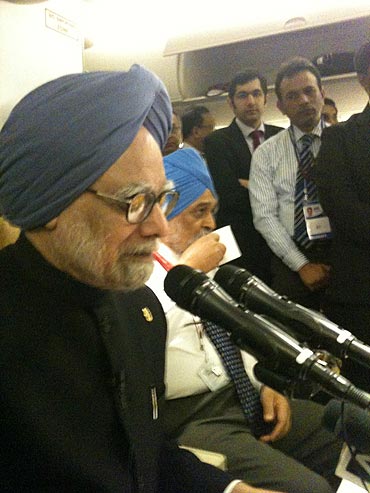
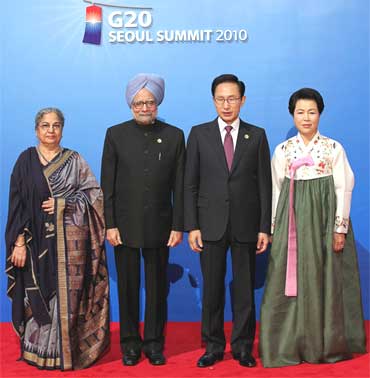
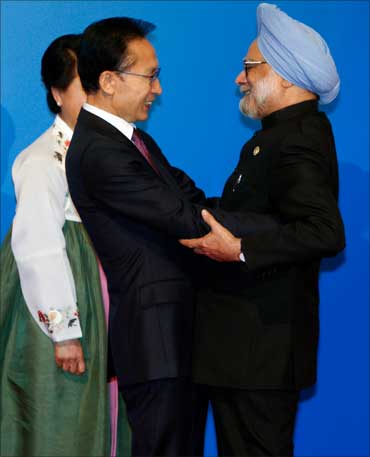
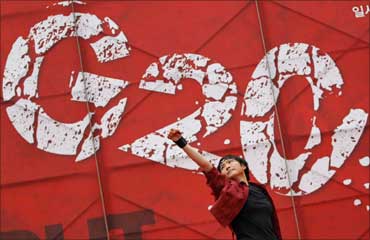
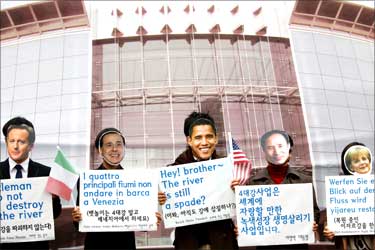
article